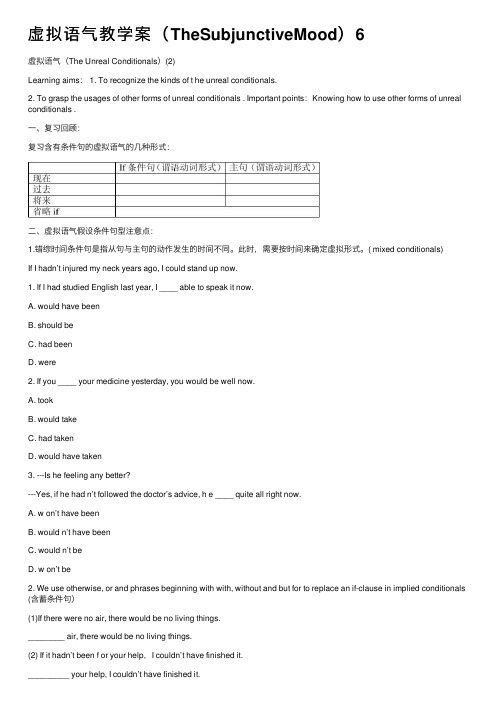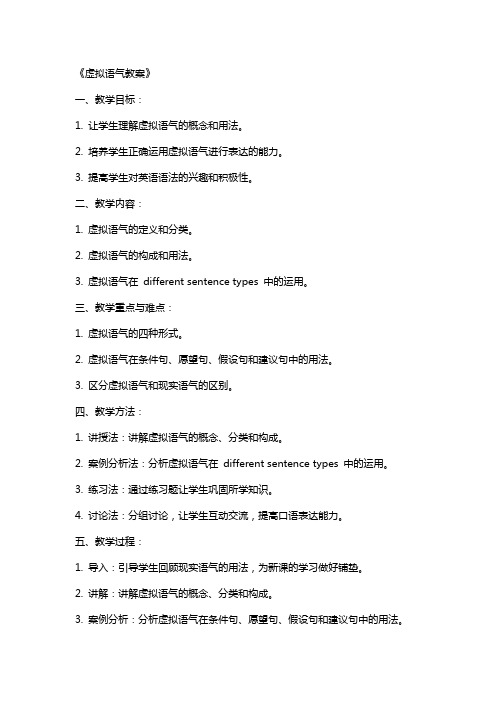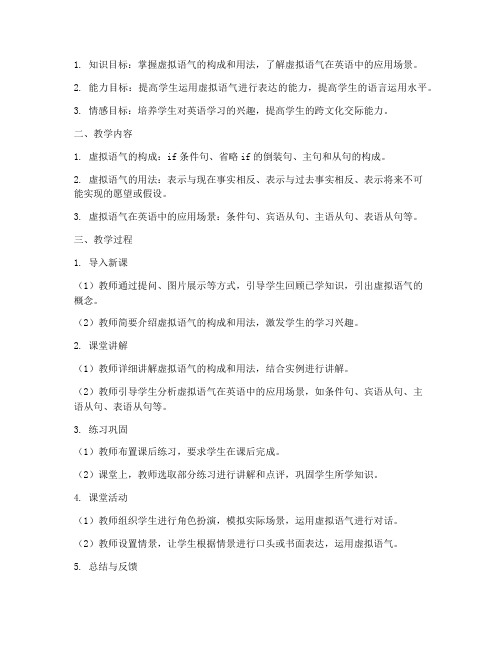虚拟语气教案 (2)
unit2_虚拟语气教学设计

unit2_虚拟语气教学设计高中英语选修6 Unit2 Grammar Subjunctive Mood 教学设计Teaching ProceduresStep1 Lead--in1.Introduce the usage if-clause to the students and review the three situations to the students: 1)opposite to the present fact 2) opposite to the past fact 3)oppositeto the future fact2.Introduce the three examples to the students1)If I God should give me another chance, I would say three words to the girl “I love you”.2)If Jack hadn’t been on board Titanic, Jack would not have met Rose.3)If I were to live till 2154, I would be one of them and live in the Pandora.Step2 The introduction of the subjunctive mood used in if-clause1.Ask students to fill in the blanks and find out which tense should we use in different situations2.introduction of the mixed conditionals1)show the Ss two pictures and according to the picture ask them to make two sentencesa.If he hadn’t slept during the English class, he would know how to spell the new words now.b.If he hadn’t copied the other’s homework, he would not be punished by his teacher now.2)introduction of the concept of the mixed conditionalsWhen the tense in the if-clause and the main clause are not the same, we use the mixed conditionale.g. If you had come and attended the meeting yesterday, you would know what we are doing now.If you had followed my advice, you would not be in troublenow.3) introduction of the inversion in the if-clauseWe can omit If and place should, were, had in the beginning of the sentence.e.g. Were I Obama, I would company my daughter every day.4. exercise If you were the manager here, what would you do?Were you the manager here, what would you do?Step 3 introduction of the subjunctive mood used in the object clause1.the object clause after wish1)show the Ss some examples of the wish clause and ask them to conclude the rule of it.the example sentencesa.I wish I were a bird.b.I wish I had finished this homework.c.I wish it would rain tomorrow.d.I wish I hadn’t made such a mistake.2)the rules of the wish clausewish----- 与过去事实相反:过去完成时与现在事实相反:过去式与将来事实相反:would/could/might+ do3)exercisea.I wish I were (be) ten years younger now.b.I wish I had said (say) such tough words to you.c.I wish it would rain(rain)tomorrow.2.The clause after “would rather”1)show the Ss some examples of the wish clause and ask them to conclude the rule of it.a.I would rather you paid me now.b.I would rather you told me the truth at present.c.I would rather you had been present.d.I would rather you had gone there yesterday.e.Don’t come.I would rather you came tomorrow.2)the rules of the clause would ratherwould rather: 与现在事实相反--- 一般过去时与过去事实相反--- 过去完成时与将来事实相反--- 一般过去时3)exercise: ask Ss to fill in the blanksa.It’s getting late. I’d rather you left (leave) now.b.John wants to see me today. I would rather he came (come) here tomorrow than today.c.I’d ra ther she sat (sit) next to me.d.I’d rather you hadn’t said (say)it.3.The object clause in the sentence expressing suggestion1)Ask Ss to observe the sentences and find out which sentences using the subjunctive mood.Suggested answers:a.My family insisted that I should not give in, but stay and fight.b.Please advise me which book I should read first.c.He ordered that the work should be started at once.2)宾语从句中出现动词: 一个坚持, 两个命令, 三个建议, 四个要求。
虚拟语气教学案(TheSubjunctiveMood)6

虚拟语⽓教学案(TheSubjunctiveMood)6虚拟语⽓(The Unreal Conditionals)(2)Learning aims: 1. To recognize the kinds of t he unreal conditionals.2. To grasp the usages of other forms of unreal conditionals . Important points:Knowing how to use other forms of unreal conditionals .⼀、复习回顾:复习含有条件句的虚拟语⽓的⼏种形式:⼆、虚拟语⽓假设条件句型注意点:1.错综时间条件句是指从句与主句的动作发⽣的时间不同。
此时,需要按时间来确定虚拟形式。
( mixed conditionals)If I hadn’t injured my neck years ago, I could stand up now.1. If I had studied English last year, I ____ able to speak it now.A. would have beenB. should beC. had beenD. were2. If you ____ your medicine yesterday, you would be well now.A. tookB. would takeC. had takenD. would have taken3. ---Is he feeling any better?---Yes, if he had n’t followed the doctor’s advice, h e ____ quite all right now.A. w on’t have beenB. would n’t have beenC. would n’t beD. w on’t be2. We use otherwise, or and phrases beginning with with, without and but for to replace an if-clause in implied conditionals (含蓄条件句)(1)If there were no air, there would be no living things.________ air, there would be no living things.(2) If it hadn’t been f or your help,I couldn’t have finished it._________ your help, I couldn’t have finished it.(3) If I hadn’t been busy that day, I would have gone there with them.I was busy that day. _________ I would have gone there with them.三、虚拟语⽓特殊句型:现在:过去时(were)1. wish过去:过去完成时的宾语从句将来:would/could/might+V(原).eg. I wish I _______as tall as you. (be)I wish I ____________( not eat ) so much watermelon in the past.2. would rather that 现在:过去时过去:过去完成时将来:过去时eg. I would rather you ______ (come) here now.I would rather you _____ (come) tomorrow.I would rather I ________( not tell) you that secret yesterday.3. if only意为:要是...那该多好啊; 真希望...;由其引起的感叹句,谓语动词的形式⽤虚拟语⽓。
虚拟语气教案

•"DoyoumindifIsmokehere?""I'dratheryoudidn't."
•IwishIknewwhatwasgoingtohappen.
•I'dsooneryoudidn'taskmethatquestion.
•IwishthatIhadlistenedtoyouradvice.
•2.predicativeclause:
•e.g.Ourdecisionisthattheschoolremainclosed.
•n+is+that
Lookatthefollowingsentences:
•1.Theresolutionthatwomenbeallowedtojointhesocietywas
•1.Heasksthathebegivenanopportunitytoexplainhiscase.
•2.ShedemandedthatIpayherimmediately.
•3.HeinsistedthatJenniesendhertodancingschool.
•4.Irecommendedthateveryonebuythisdictionary.summary:
-ved:suggested,advised,requested,demanded,resolved,required,
commanded,ordered,proposed,
etc.
III.subjunctivemoodinobjectiveclause
•Lookatthefollowingsentences:
《虚拟语气教案》

《虚拟语气教案》一、教学目标:1. 让学生理解虚拟语气的概念和用法。
2. 培养学生正确运用虚拟语气进行表达的能力。
3. 提高学生对英语语法的兴趣和积极性。
二、教学内容:1. 虚拟语气的定义和分类。
2. 虚拟语气的构成和用法。
3. 虚拟语气在different sentence types 中的运用。
三、教学重点与难点:1. 虚拟语气的四种形式。
2. 虚拟语气在条件句、愿望句、假设句和建议句中的用法。
3. 区分虚拟语气和现实语气的区别。
四、教学方法:1. 讲授法:讲解虚拟语气的概念、分类和构成。
2. 案例分析法:分析虚拟语气在different sentence types 中的运用。
3. 练习法:通过练习题让学生巩固所学知识。
4. 讨论法:分组讨论,让学生互动交流,提高口语表达能力。
五、教学过程:1. 导入:引导学生回顾现实语气的用法,为新课的学习做好铺垫。
2. 讲解:讲解虚拟语气的概念、分类和构成。
3. 案例分析:分析虚拟语气在条件句、愿望句、假设句和建议句中的用法。
4. 练习:布置练习题,让学生巩固所学知识。
5. 讨论:分组讨论,让学生互动交流,提高口语表达能力。
7. 作业布置:布置课后作业,巩固所学知识。
六、教学评价:1. 课后作业:评估学生对虚拟语气的理解和运用能力。
2. 课堂练习:观察学生在练习中的表现,及时发现问题并进行针对性的辅导。
3. 小组讨论:评价学生在讨论中的参与程度和口语表达能力。
4. 考试:设置有关虚拟语气的试题,检验学生对知识的掌握程度。
七、教学资源:1. 教材:选用合适的英语教材,如《新概念英语》、《大学英语》等。
2. 教案:根据教材内容编写详细的教学计划。
3. 课件:制作课件,辅助讲解和展示虚拟语气的用法。
4. 练习题:编写练习题,巩固学生对虚拟语气的掌握。
八、教学进度安排:1. 第一课时:介绍虚拟语气的概念和分类。
2. 第二课时:讲解虚拟语气的构成和用法。
3. 第三课时:分析虚拟语气在条件句、愿望句、假设句和建议句中的用法。
虚拟语气教学设计方案

1. 知识目标:掌握虚拟语气的构成和用法,了解虚拟语气在英语中的应用场景。
2. 能力目标:提高学生运用虚拟语气进行表达的能力,提高学生的语言运用水平。
3. 情感目标:培养学生对英语学习的兴趣,提高学生的跨文化交际能力。
二、教学内容1. 虚拟语气的构成:if条件句、省略if的倒装句、主句和从句的构成。
2. 虚拟语气的用法:表示与现在事实相反、表示与过去事实相反、表示将来不可能实现的愿望或假设。
3. 虚拟语气在英语中的应用场景:条件句、宾语从句、主语从句、表语从句等。
三、教学过程1. 导入新课(1)教师通过提问、图片展示等方式,引导学生回顾已学知识,引出虚拟语气的概念。
(2)教师简要介绍虚拟语气的构成和用法,激发学生的学习兴趣。
2. 课堂讲解(1)教师详细讲解虚拟语气的构成和用法,结合实例进行讲解。
(2)教师引导学生分析虚拟语气在英语中的应用场景,如条件句、宾语从句、主语从句、表语从句等。
3. 练习巩固(1)教师布置课后练习,要求学生在课后完成。
(2)课堂上,教师选取部分练习进行讲解和点评,巩固学生所学知识。
4. 课堂活动(1)教师组织学生进行角色扮演,模拟实际场景,运用虚拟语气进行对话。
(2)教师设置情景,让学生根据情景进行口头或书面表达,运用虚拟语气。
5. 总结与反馈(1)教师对本节课所学内容进行总结,强调重点和难点。
(2)教师鼓励学生提出疑问,解答学生在学习过程中遇到的问题。
四、教学评价1. 课堂表现:观察学生在课堂上的参与度、提问、回答问题等方面。
2. 课后练习:检查学生的课后练习完成情况,了解学生对虚拟语气的掌握程度。
3. 课堂活动:观察学生在课堂活动中的表现,了解学生运用虚拟语气进行表达的能力。
五、教学反思1. 教师根据学生的学习情况,调整教学策略,提高教学质量。
2. 教师关注学生的个体差异,因材施教,提高学生的学习兴趣。
3. 教师鼓励学生积极参与课堂活动,提高学生的语言运用能力。
大学虚拟语气教案

课程目标:1. 让学生了解虚拟语气的概念和用法。
2. 帮助学生掌握虚拟语气在句子中的不同用法,包括与现在事实相反、与过去事实相反和与将来事实相反。
3. 提高学生运用虚拟语气进行英语表达的能力。
教学对象:大学英语学习者教学时间:2课时教学准备:1. 教学PPT或黑板2. 课本或相关教学材料3. 练习题和答案教学过程:第一课时一、导入1. 通过日常生活中的例子引入虚拟语气的概念,如假设情景的描述。
2. 提问学生:“你们在生活中有没有遇到过需要用虚拟语气的情况?”二、讲解虚拟语气的概念和用法1. 解释虚拟语气的定义:虚拟语气是表示与事实相反或不可能实现的假设、愿望、建议等。
2. 讲解虚拟语气的基本结构:- 与现在事实相反:if + 主语 + were, 主语 + would/could/might/should + 动词原形- 与过去事实相反:if + 主语 + had + 过去分词,主语 +would/could/might/should + have + 过去分词- 与将来事实相反:if + 主语 + were to/should + 动词原形,主语 + would/could/might/should + 动词原形三、示例讲解1. 展示几个虚拟语气的句子,并解释其含义。
2. 让学生尝试翻译句子,加深对虚拟语气用法的理解。
四、练习1. 让学生完成一些关于虚拟语气的练习题,巩固所学知识。
2. 教师解答学生疑问,纠正错误。
第二课时一、复习1. 复习上一节课所学的虚拟语气概念和用法。
2. 通过提问或小组讨论的方式,让学生回顾所学内容。
二、深入讲解虚拟语气在特定语境中的运用1. 讲解虚拟语气在条件状语从句、让步状语从句、结果状语从句和目的状语从句中的运用。
2. 通过具体例句,让学生理解虚拟语气在不同从句中的用法。
三、练习1. 让学生完成更多关于虚拟语气的练习题,包括不同语境下的虚拟语气运用。
2. 教师解答学生疑问,纠正错误。
虚拟语气教案
II. Teaching procedures:
教学活动
Activities
设计意图
Intentions
互动模式&时间
IP & time
Step 1
1. Ss enjoy three music excerpts and pay attention to the if-clauses in the lyrics.
2. Fill out the missing words.
从歌词中感悟虚拟条件句,复习虚拟语气。
IW, CW
Step 2
1. Ssread the passage about Liu Xiang carefully and underline the sentences using Subjunctive Mood.
2. Tell the usage of each Conditional.
1.让学生在语境中快速找出虚拟条件句。
2.引导学生说出总结各种虚拟条件句的用法。
IW, CW
Step 3
Ss read the if-clauses in the passage again and fill in the blanks about the Conditionals.
Unit21. Lesson 1
Subjunctive Mood In ቤተ መጻሕፍቲ ባይዱf-clauses
I. Teaching objectives:
By the end of the class, students are able to:
1.review the Subjunctive Mood and practice using if-clause sentences.
高中英语Unit4SectionⅢGrammar__虚拟语气Ⅱ教案含解析牛津译林版选修6
Section ⅢGrammar——虚拟语气(Ⅱ)一、错综时间条件句(混合条件句)当条件状语从句表示的动作或行为和主句表示的动作或行为所发生的时间不一致时,被称为“错综时间条件句”,动词的形式要根据它所表示的时间作出相应的调整。
If you had followed my advice just now,you would be better now.如果你刚才听了我的建议,你现在就好多了。
If he were free today,we would have sent him to Beijing.如果他今天有空的话,我们就派他去北京了。
[即时训练1] 用所给词的适当形式填空①If you had studied (study)hard before,you would be (be)a college student now.②If you hadn't lost the map,we would be (be)back in the hotel now.二、含蓄虚拟条件句有时虚拟的条件不通过条件从句表达出来,而是暗含在单词、短语或上下文中,这时需要根据句中所表述的意义以及某些特定的信息词来判断此时需要采用的形式。
常用词或短语有:with,without,but for,or else,or,otherwise等。
But for her help,they couldn't have run over the mountain in such a short time.要不是她的帮助,他们不会在那么短的时间内翻过那座山。
I was ill that day.Otherwise,I would have taken part in the sports meeting.我那天病了。
否则,我就参加运动会了。
He must have been there,or he never could know the place so well.他一定去过那儿,否则他决不会如此了解那个地方。
英语虚拟语气教案
英语虚拟语气教案一、教学目标1.让学生理解虚拟语气的概念和用法。
2.培养学生运用虚拟语气进行交流和表达的能力。
3.提高学生对英语语法知识的掌握。
二、教学内容1.虚拟语气的定义和分类2.虚拟语气的用法及句型结构3.虚拟语气在日常生活中的应用三、教学重点与难点1.重点:虚拟语气的用法及句型结构2.难点:虚拟语气的运用和实际情景的创设四、教学过程1.导入(1)通过一个有趣的故事引入虚拟语气的概念,激发学生的兴趣。
(2)让学生猜测故事中的虚拟语气句子,并引导学生思考虚拟语气的作用。
2.理解虚拟语气的定义和分类(1)用简洁明了的语言解释虚拟语气的定义。
(2)通过示例句,让学生了解虚拟语气的分类:与现在事实相反的虚拟、与过去事实相反的虚拟、与将来事实相反的虚拟。
3.学习虚拟语气的用法及句型结构(1)分别讲解三种虚拟语气的用法和句型结构。
(2)通过练习,让学生掌握虚拟语气的用法。
4.实践虚拟语气的应用(1)设计一些实际情景,让学生运用虚拟语气进行表达。
(2)让学生分组进行角色扮演,运用虚拟语气进行交流。
(2)通过练习,巩固学生对虚拟语气的掌握。
6.作业布置(1)让学生翻译一些含有虚拟语气的句子。
(2)让学生编写一段含有虚拟语气的对话或短文。
五、教学反思1.本节课通过生动的故事导入,激发了学生的学习兴趣。
2.在讲解虚拟语气的用法和句型结构时,注重理论与实践相结合,让学生在实际情景中运用虚拟语气。
3.通过分组练习和角色扮演,提高了学生的互动性和积极性。
4.作业布置有助于巩固学生对虚拟语气的掌握。
5.教学过程中,注意关注学生的反馈,及时调整教学方法和节奏。
六、教学评价1.课后对学生的学习效果进行评价,了解学生对虚拟语气的掌握程度。
2.通过作业和课堂表现,评价学生的参与度和积极性。
3.收集学生的意见和建议,不断改进教学方法,提高教学质量。
七、教学延伸1.进一步讲解虚拟语气的高级用法,如倒装句、强调句等。
2.结合实际生活,让学生学会在不同场景中运用虚拟语气。
虚拟语气教案2
Unreal conditionalsUnreal conditionals and things hoped for or desiredThere are other ways to talk about unreal situations apart from those we have learnt.1. We use mixed conditionals when the time of the main clause is different from that of the if clause.1)If I were you,I wouldn't have missed the film last night.如果我是你,我就不会错过昨天晚上的那部电影。
(从句与现在事实相反,主句与过去事实相反。
)2)If he had followed the doctor's advice,he would recover already.如果他遵照医生的劝告,现在病就好了。
(从句与过去事实相反,主句与现在事实相反。
)3) If the boy hadn't been saved this afternoon, his family would not be in peace now.如果那个男孩今天下午没有被救,他的家现在就不会如此安宁。
4) If the machine were in good conditions, we would have used it in our last experiment.要是这台机器情况良好,我们上次就将它用于试验了。
5) If you were to visit Hainan in two days, I could arrange for some of my friends there to meet you at the airport.假如你过两天去海南,我现在就可以安排我在那儿的朋友去机场接你。
- 1、下载文档前请自行甄别文档内容的完整性,平台不提供额外的编辑、内容补充、找答案等附加服务。
- 2、"仅部分预览"的文档,不可在线预览部分如存在完整性等问题,可反馈申请退款(可完整预览的文档不适用该条件!)。
- 3、如文档侵犯您的权益,请联系客服反馈,我们会尽快为您处理(人工客服工作时间:9:00-18:30)。
Subjunctive mood一. Teaching aims:1、Knowledge and ability1). Know what the subjunctive mood refers to2). Know the different forms of the subjunctive mood3). Master the structure of the subjunctive mood about “if …” and the structures of the different forms of the subjunctive mood.4). Do some exercises about the grammar and flexible to use it in specific language environment.2、Process and method goals :Combine guidance of teachers and student self-learning;combine to grammar explanations and grammar exercises enable students to master the subjunctive mood in use.3、Emotional attitudes and values objectives:To develop students' independent learning and the exploring ability, increase their awareness of cooperation, to improve students' language skills and the ability to express their views.二、teaching difficult pointCan use this rules of grammar to complete various training exercises and use in the actual language.三.、Teaching important points1) The subjunctive mood is often found in a clause be ginning with the word “if”.2) Get students to learn the proper forms of verbs in subjunctive mood.四、Teaching methods:1) Multi-media teaching2) Cooperative learning-for example: group discussion3)Inductive method五、Teaching aids:PPT,video五、Teaching procedures:Step 1 Lead in and greeting1.GreetingT: Good morning! Everyone, how are you today?Ss:T: What day is it today?Ss:2.lead in----------Watch a video-----周星驰的《大话西游》经T: Would you like to watch a video?Ss:T: When you watch the video, pay attention to the movie lines, and then try to translate it into English.T: Could you give a voice to the character in the movie in English?S:T: Ok, look at the classic dialogue of the film, and read together.If God can give me another chance, I will say 3 words to her --- I love you.If you have to give a time limit to this love, I hope it is 10 thousand years.T: Very good! I will show you some picture, and I want you to describe the meaning of pictures according to these two sentences.(I , study, the school of America)T: Who wants to try?S: If I have money, I will go to study in America.T: Great! Who wants try again?S:T: Just now our classmates give us so many sentences; can find out the common point of these sentences?Ss: All these sentences are beginning with "if”.T: Yes. Very good! These sentences are "if" conditional sentences.Step2 presenting1、Suppose three ConditionsBy setting the above three situations, show a different time condition virtual sentence, let the students find the rules of grammar, and summed up the different time a non real conditionals.1). First conditionalIf I have enough money, I will go to study in America.2). Second conditionalIf I had enough money, I would go to study in America.3). Third conditionalIf I had had enough money, I would have gone to study in America.2、Explain in detail the meaning and usage of the subjunctive mood。
T: Who can find out the differences of these sentences?S: These sentences represent the different time condition of assumptions.T: Yes. There are the assumptions. Today we will learn the subjunctive mood that is used to express the imaginary of the speaker.1) The definition of toneEnglish verbs can generally be with three different tone: indicative, imperative and subjunctive. Different tone with a different form of the verb (sometimes also with syntactic form) to represent. 英语的动词一般可带有三种不同的语气:陈述语气,祈使语气和虚拟语气。
不同的语气用动词的不同形式(有的还借助句法形式)来表示。
2) The definition of subjunctive moodSubjunctive mood is a special form of the verb.One is used to represent the words of the speaker is not a fact, but a hypothesis, speculation, suspicion (used in the adverbial clauses of condition or in an adverbial clause of concession); 一是用来表示说话人所说的话不是一个事实,而是一种假设、猜测、怀疑等(常用在条件状语从句中或让步状语从句中);One is to show the speaker's desire, request, command, advice and so on (used in the noun clauses). 一是表示说话人的愿望、要求、命令、建议等(常用在名词性从句中)。
In short, subjunctive mood use to express the conditions of not a fact or is unlikely to happen. 一是表示说话人的愿望、要求、命令、建议等(常用在名词性从句中)。
3、Ask students to analyze more sentences and try to summarize the structure and meaning of the subjunctive mood. Pay special attention to their verb forms. The subjunctive mood beginning with the word “if”:2) If he were here, everything would be all right.3) If he had taken my advice, he would have succeeded in the competition.4) If it were to rain tomorrow, the football match would be put off.Step3: Grammar learning:1、Learning the structure of the subjunctive mood and the form of predicate verb.1)Real conditions for declarative, hypothetical situations likely to occur.(不用虚拟语气)if条件从句主句一般现在时shall/will + 动词原形E.g.: If we have chances, we can have further cooperation.If I have another chance, I will visit China again.★真实条件中,主句不能用be going to表示将来,该用shall, will.e.g.: If you leave now, you will never regret it. (√)If you leave now, you are never going to regret it. (×)★表示真理时,主句谓语动词不用shall (will) +动词原形,而直接用一般现在时的动词形式。
